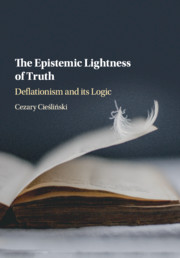Book contents
12 - The Strength of Reflection Principles
from Part III - Reflection Principles
Published online by Cambridge University Press: 30 November 2017
Summary
In this chapter, I am going to discuss various reflection principles, taking into account both their arithmetical and truth-theoretical strength. As for the arithmetical component, it would be good to know at least whether adding a given reflection principle leads us beyond the base theory (Peano arithmetic). On the other hand, when assessing truth-theoretic strength, one needs to know how powerful the reflection principles are in proving truth-theoretic generalisations. All in all, one needs to be clear about how helpful reflection can be in solving the problem of deductive weakness of some truth theories (conservative or disquotational ones).Without such a knowledge, there seems to be little point of entering a philosophical debate about reflection.
Definition 1.5.1 has introduced three types of reflection principles for an arithmetical theory S: the global, the uniform, and the local one. Here I will consider reflection in a more general setting. Intuitively, a reflection principle for a class Γ (there is no assumption that Γ contains arithmetical sentences only) is a sentence or a set of sentences stating the soundness of Γ. The principle in question can have a form of a global principle, or it can be a schematic expression of soundness, in the style of (UR) or (LR), that is, it can be (cf. again Definition 1.5.1). In general, the strength of the principle will depend on the choice of Γ.
In the context of discussing axiomatic characterisations of light notions of truth, an obvious choice of Γ is the set of disquotational axioms. Indeed, it turns out that, when applied to such a set, some forms of reflection produce theories which are truth-theoretically strong. I will start, however, with a discussion of reflection for some classes Γ containing arithmetical sentences only. This will permit to get a clearer overall picture of the situation. At this initial stage, before venturing further, I want (at the very least) to indicate some classes Γ for which reflection seems intuitively natural and obvious. A more ambitious objective would be to approach the question of what really explains the arithmetical strength of reflection principles.
- Type
- Chapter
- Information
- The Epistemic Lightness of TruthDeflationism and its Logic, pp. 207 - 231Publisher: Cambridge University PressPrint publication year: 2017



